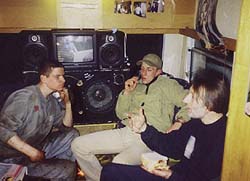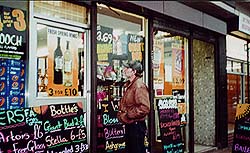|
||
|
||
|
||
|
||
part 2 / part 1
From that point on, my life suddenly began to change for the better. I realised that I
was not alone in the world, and that good people were to be found as well. Fired up
with new confidence, I resolutely started off in search of work and adventure.
A sense that I should leave London was growing on me. I longed for the wide spaces
and the clean air of the countryside. I stood by the roadside trying to stop a car by
flailing my arms like a wounded bird.
Motorists swerved to avoid me as if they did not notice my desperate gestures. The
sun was sliding toward the horizon. It started raining and I was soaked in no time. I
faced the sad prospect of spending a night outdoors.
But the 26th car to which I waved suddenly stopped. The driver was a big
Englishman of about 50 with a manly, weather-beaten face. He looked into my
honest eyes and, not noticing a shadow of slyness, offered me work. I did not ask
any questions. We drove outside the city. I feasted my eyes on the English
countryside: barns, stables, greenhouses. Everything was exactly like in my country,
only somehow neater.
We drove for about two hours. We left country houses behind us. I let my
imagination run wild, smiling dreamily and picturing myself, well-fed, rosy-cheeked
and smelling of sweat, bread and ploughing some kind of field.
 "This is it," said Mel. I peered into the twilight trying to make out what he was
showing me. The whole space as far as the eye could sec was full of merry-go-
rounds, roller coasters, shooting ranges and other attractions.
"This is it," said Mel. I peered into the twilight trying to make out what he was
showing me. The whole space as far as the eye could sec was full of merry-go-
rounds, roller coasters, shooting ranges and other attractions.
My new job was to deliver and install children's attractions in parks in small towns
and villages. And we dismantled the ones that we found there, put them in the vans
and took them further to other villages so as to make the life of English kids more
cheerful.
Our mechanisms were huge and unwieldy. As soon as we arrived in a new town the
whole team jumped out of the bus and started working as efficiently as an artillery
crew. Everyone knew what "he was to do and I was the only one who dashed from
one place to another pretending to be very busy. The owner's son, a chubby 12-year-
old, threw his mantle of protection over me. The boy was named Scott. Scott would
shout to me: "Take this and carry it there. Bring that." He got a kick out of
torturing me. Apparently, lie was thrilled that a grown-up man was obeying his
orders and sometimes he went a little too far, as when he told me to take paper cups
and empty plastic bags to the dustbin. I was on the verge of hating him, but I
suppressed that destructive emotion. I even managed to talk with him while carrying
a bar of iron.
"Tell me, Scott, how are you doing at school?" I asked, red-faced with exertion.
"I don't go to school," the kid replied proudly. "Work is better."
"You're wrong, Scott," I replied in a hoarse voice. I, for one, have a university
degree. And you see, I am all right. Education is everything."
One fine day in the town of Gravesend on the bank of Father Thames I was given to
another boss. He had a huge rink with toy cars. The task given to me and my
workmate called Andrew was to lay a flat basis and cover it with metal sheets of
two-by-two metres. I did a passable job laying the foundation, but when it came to
lugging heavy metal sheets I realised that I was in for yet another test: capitalist
exploitation. Labourers from all over the amusement park came to look at the
Russian at work. The funny part was that Andrew was young, two metres tall and
full of energy, and I was a skinny Russian enfeebled by undernourishment and a
sore throat. Andrew easily snatched the sheet out of the pack, grabbed it and carried
it across the field with a lilt. I barely managed to grab the sheet from the other side
and, stumbling and swaying from side to side, I tagged along ever in danger of
falling and drop ping the heavy sheet on my feet. My fingers were the first to give
out. They could no longer hold the heavy metal sheet. The inevitable happened, and
I dropped the sheet on my feet. Andrew swore a mouth-filling oath to the
amusement of the crowd.
Having got tired from being exploited, I firmly resolved to le"ve that camp of work
and leisure. At night my young friends did not sleep at all, but smoked pot and had
fun. I was dead tired from lack of sleep and hard-work. More over, my males made
up to ‡100 a day, whereas I only got ‡15. Of course, my employers took great risks:
they could be fined or stripped of their licence. Moreover, they gave me work not
because they badly needed an extra pair of hands — they just took pity on me. But
remember, folks: there arc people in Britain who are willing to do hard unskilled
work. They also have unemployment in the provinces. No one is waiting for us here.
In the evening I told my mates that my stint with them was over. We had a modest
farewell party. The party was in full swing when my young oppressor, Scott entered
our trailer.
"You leaving?" he asked me.
"Leaving, Scott," I said, enunciating his name with gusto.
"Do you have a lighter?"
"No, Scott! You may laugh at me, but I don't have a lighter."
Scott took out of his pocket a beautiful lighter and held it out to me.
"Here, lake it, it's a real Ronson," he said with emotion. "As a keepsake. It's
absolutely new. Fill it with gasoline — it'll last you a long time."
Suddenly shy with surprise, I fell silent.
"You arc a great guy," Scott slapped me on the shoulder and left the trailer.
No, these Brits are great guys indeed. Their gift to me was the most important thing-
in life — unshakeable faith in people. I shouldn't have been so unfair to them from the
start.
 In the morning I took a commuter train to London. The weather was beautiful.
Throughout the day I played a tourist, lolling on the grass in Hyde Park and basking
in freedom and idleness. As the election campaign rolled on, the leaders of the major
parties made new pro gram statements. A very import ;n it slogan was voiced by the
Conservative leader William Hague regarding a reform of the .system of refugee
accommodation in Britain. In his view, under Labour rule Britain has become a
haven for illegal immigrants, and the acceptance regulations should be tightened up.
Hague made these comments at Dover. Soon refugees will find their road to Britain
far more difficult.
In the morning I took a commuter train to London. The weather was beautiful.
Throughout the day I played a tourist, lolling on the grass in Hyde Park and basking
in freedom and idleness. As the election campaign rolled on, the leaders of the major
parties made new pro gram statements. A very import ;n it slogan was voiced by the
Conservative leader William Hague regarding a reform of the .system of refugee
accommodation in Britain. In his view, under Labour rule Britain has become a
haven for illegal immigrants, and the acceptance regulations should be tightened up.
Hague made these comments at Dover. Soon refugees will find their road to Britain
far more difficult.
I walked to London Bridge and crossed to the other side of the Thames. I went to
the Imperial War Museum and back. Twilight was falling. Pavement artists on
Piccadilly were putting their paintings into their cars. Crowds were thinning in the
streets. The windows of shops and restaurants glittered with lights. Delicious food
smells tickled my nostrils. I saw the first beggars. By the way, in England you won't
meet beggars with missing limbs or suffering from leprosy. They have an invalid
protection programme. All the beggars and tramps look cheerful. They were lying
on the pavement, their feet covered with sack cloth looking at the passers-by. And
oddly enough the passers-by dispensed charity. I had never seen beggars rummaging
in garbage containers. They were the elite of tramps. They smoked cigars and not
cigarette stubs. I got talking with one of them, a guy from Oslo named Kevin. We
were sitting on the pavement in front of a shop on Portland Place and smoking his
cigarettes.
"Our life is a philosophy," he pontificated. "Thanks to me these people come to think
of themselves as generous. They feel prosperous only because of me. Thank you. (He
was given alms). I help them to appreciate their luck. Imagine that a person is in
trouble. His wife has left him. His friend betrayed him. And now he gives me some
money and thinks: But for the grace of God I might be sitting there in stead of this
guy. So, I am all right."
In Piccadilly Circus the scene is lively. The sound of music, the wailing of police
vehicles, laughter and the screams of drunks. There are many street musicians and
dancers. Africans beat drums and dance the rumba. For a whole hour I listened to
virtuoso playing by a black street-guitarist. He was playing some classics. I chose
one of the liveliest places, sat down on my sack and put a leather cap in front of me.
I waited. Within an hour I got a total of three pounds. I felt cold. I had no sackcloth
to cover myself with. After some simple arithmetics I concluded I would earn ‡15
within five hours.
In the morning, absolutely fagged out, I headed for Heathrow Airport and fell fast
asleep in the departures hall of terminal four. I was a happy man. My heart was
warmed by the ticket back home. A Boeing took me from pretty and prosperous
England to my country. I exuded a foul smell, but I was happy because I would take
a bath in a couple of hours and become a normal, clean and prosperous man.
"Oh, how I hate these Aeroflot meals." a swarthy girl next to me exclaimed.
"Don't worry," I reassured her. "I'll help you get rid of it."
And before she knew it I gobbled up the two meals. The spoiled little good-for-
nothing nearly clapped her hands. It is bad to be pool in any country. I learned one
lesson, friends. You should build happiness in your own country, among your own
people. We will never be accepted in other countries as being one of them. And we
have work to do here in Russia.
I also dreamed of the time when I would come to London under my real name, in a
black dinner jacket and bow-tie, go to the Wild Horse bar, order a beer and give
Julie a bouquet of flowers, a patented drug for hangover to Malkiados, a new bicycle
to Gary, a new set of dental plates to Ronnie and some textbooks to Scott. I would
loudly ask their forgiveness and say thank you to all of them.
Alex Meshkov
< Раздел: Города и люди >
<
home >
© copyright